Mercedes C-Class Sedan vs VW Passat – Which model is better for everyday use?
Everyday use, family trips or long-distance drives – here’s where the differences show.
Discover whether Mercedes C-Class Sedan or VW Passat fits your lifestyle better.
Costs and Efficiency:
Looking at overall running costs, both models reveal some interesting differences in everyday economy.
VW Passat has a a bit advantage in terms of price – it starts at 35700 £, while the Mercedes C-Class Sedan costs 41200 £. That’s a price difference of around 5432 £.
Fuel consumption also shows a difference: VW Passat manages with 0.30 L and is therefore significantly more efficient than the Mercedes C-Class Sedan with 1.60 L. The difference is about 1.30 L per 100 km.
As for range, the VW Passat performs a bit better – achieving up to 133 km, about 16 km more than the Mercedes C-Class Sedan.
Engine and Performance:
Power, torque and acceleration say a lot about how a car feels on the road. This is where you see which model delivers more driving dynamics.
When it comes to engine power, the Mercedes C-Class Sedan has a convincingly edge – offering 680 HP compared to 272 HP. That’s roughly 408 HP more horsepower.
In acceleration from 0 to 100 km/h, the Mercedes C-Class Sedan is clearly quicker – completing the sprint in 3.40 s, while the VW Passat takes 5.80 s. That’s about 2.40 s faster.
In terms of top speed, the Mercedes C-Class Sedan performs to a small extent better – reaching 280 km/h, while the VW Passat tops out at 250 km/h. The difference is around 30 km/h.
There’s also a difference in torque: Mercedes C-Class Sedan pulls significantly stronger with 1020 Nm compared to 400 Nm. That’s about 620 Nm difference.
Space and Everyday Use:
Cabin size, boot volume and payload all play a role in everyday practicality. Here, comfort and flexibility make the difference.
Both vehicles offer seating for 5 people.
In curb weight, VW Passat is minimal lighter – 1573 kg compared to 1695 kg. The difference is around 122 kg.
In terms of boot space, the VW Passat offers evident more room – 690 L compared to 455 L. That’s a difference of about 235 L.
When it comes to payload, VW Passat hardly perceptible takes the win – 577 kg compared to 570 kg. That’s a difference of about 7 kg.
Who wins the race?
The VW Passat proves to be leaves the rival little chance and therefore becomes our DriveDuel Champion!
VW Passat is the better all-rounder in this comparison.
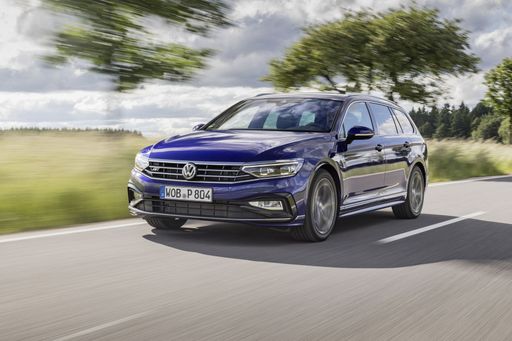
VW Passat
Mercedes C-Class Sedan
The Mercedes-Benz C-Class Sedan embodies a seamless blend of luxury and performance, capturing the quintessential essence of sophisticated driving. Its elegant design is complemented by a meticulously crafted interior, featuring premium materials and innovative technology to enhance comfort and convenience. On the road, the C-Class Saloon offers an impressive driving experience, harmonising precise handling with a composed and comfortable ride.
details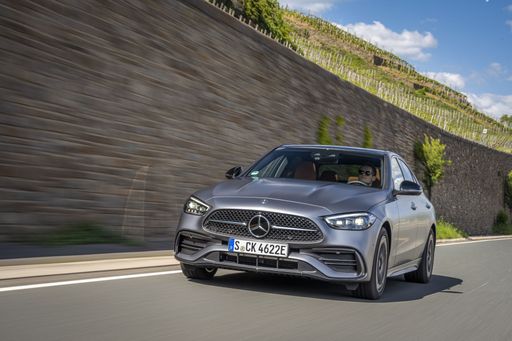 @ group-media.mercedes-benz.com
@ group-media.mercedes-benz.com
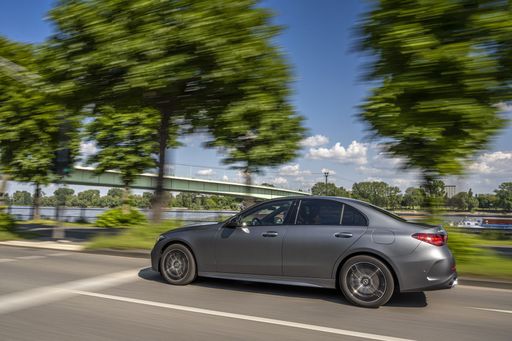 @ group-media.mercedes-benz.com
@ group-media.mercedes-benz.com
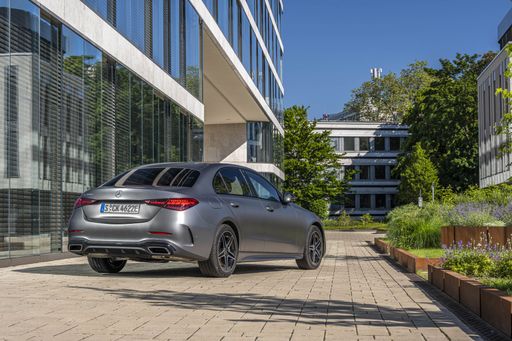 @ group-media.mercedes-benz.com
@ group-media.mercedes-benz.com
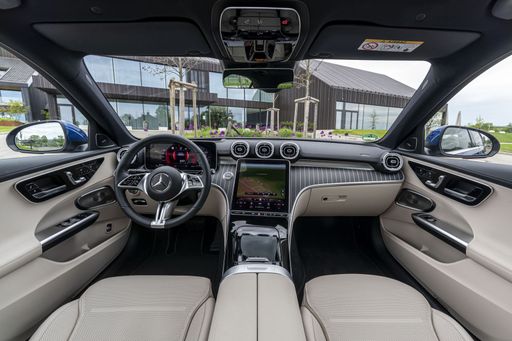 @ group-media.mercedes-benz.com
@ group-media.mercedes-benz.com
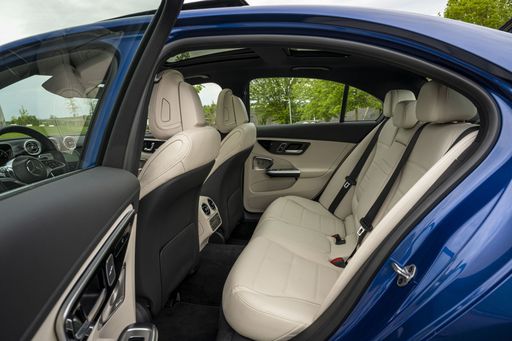 @ group-media.mercedes-benz.com
@ group-media.mercedes-benz.com
VW Passat
The VW Passat is a staple in the family saloon segment, known for its refined design and practicality. It effortlessly combines a comfortable ride with a spacious interior, making it a popular choice for long journeys. The cabin features high-quality materials and an intuitive infotainment system, providing a premium feel without sacrificing user-friendliness.
details @ volkswagen-newsroom.com
@ volkswagen-newsroom.com
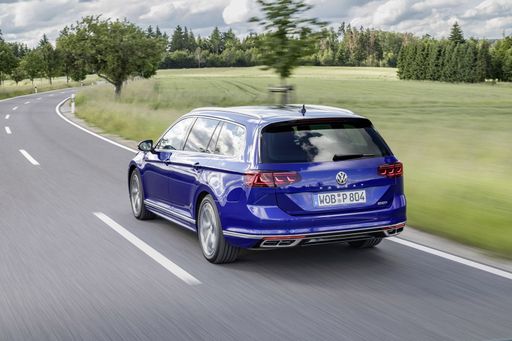 @ volkswagen-newsroom.com
@ volkswagen-newsroom.com
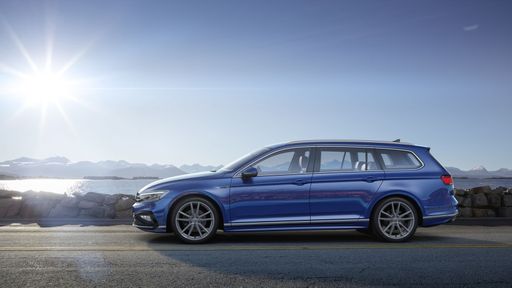 @ volkswagen-newsroom.com
@ volkswagen-newsroom.com
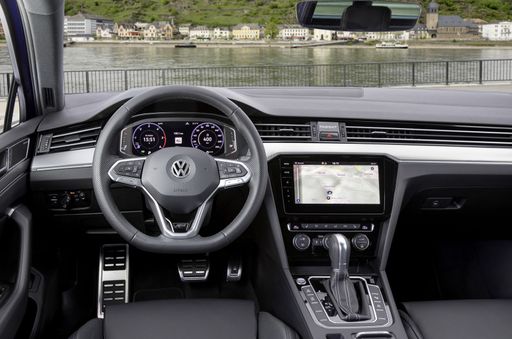 @ volkswagen-newsroom.com
@ volkswagen-newsroom.com

|

|
|
|
|
Costs and Consumption |
|
|---|---|
|
Price
41200 - 103100 £
|
Price
35700 - 58500 £
|
|
Consumption L/100km
1.6 - 9 L
|
Consumption L/100km
0.3 - 8 L
|
|
Consumption kWh/100km
-
|
Consumption kWh/100km
-
|
|
Electric Range
11 - 117 km
|
Electric Range
124 - 133 km
|
|
Battery Capacity
19.50 kWh
|
Battery Capacity
19.70 kWh
|
|
co2
41 - 205 g/km
|
co2
7 - 181 g/km
|
|
Fuel tank capacity
40 - 66 L
|
Fuel tank capacity
45 - 66 L
|
Dimensions and Body |
|
|---|---|
|
Body Type
Sedan
|
Body Type
Estate
|
|
Seats
5
|
Seats
5
|
|
Doors
4
|
Doors
5
|
|
Curb weight
1695 - 2195 kg
|
Curb weight
1573 - 1858 kg
|
|
Trunk capacity
280 - 455 L
|
Trunk capacity
510 - 690 L
|
|
Length
4751 - 4842 mm
|
Length
4917 mm
|
|
Width
1820 - 1900 mm
|
Width
1849 mm
|
|
Height
1438 - 1458 mm
|
Height
1521 mm
|
|
Max trunk capacity
-
|
Max trunk capacity
1770 - 1920 L
|
|
Payload
480 - 570 kg
|
Payload
501 - 577 kg
|
Engine and Performance |
|
|---|---|
|
Engine Type
Petrol MHEV, Plugin Hybrid, Diesel MHEV
|
Engine Type
Plugin Hybrid, Petrol, Petrol MHEV, Diesel
|
|
Transmission
Automatic
|
Transmission
Automatic
|
|
Transmission Detail
Automatic Gearbox
|
Transmission Detail
Dual-Clutch Automatic
|
|
Drive Type
Rear-Wheel Drive, All-Wheel Drive
|
Drive Type
Front-Wheel Drive, All-Wheel Drive
|
|
Power HP
183 - 680 HP
|
Power HP
122 - 272 HP
|
|
Acceleration 0-100km/h
3.4 - 8.6 s
|
Acceleration 0-100km/h
5.8 - 10.7 s
|
|
Max Speed
230 - 280 km/h
|
Max Speed
212 - 250 km/h
|
|
Torque
250 - 1020 Nm
|
Torque
250 - 400 Nm
|
|
Number of Cylinders
4
|
Number of Cylinders
4
|
|
Power kW
135 - 500 kW
|
Power kW
90 - 200 kW
|
|
Engine capacity
1496 - 1999 cm3
|
Engine capacity
1498 - 1984 cm3
|
General |
|
|---|---|
|
Model Year
2024 - 2025
|
Model Year
2024 - 2025
|
|
CO2 Efficiency Class
E, B, D, G
|
CO2 Efficiency Class
B, G, D, E
|
|
Brand
Mercedes-Benz
|
Brand
VW
|
Is the Mercedes C-Class Sedan offered with different drivetrains?
The Mercedes C-Class Sedan is offered with Rear-Wheel Drive or All-Wheel Drive.
The prices and data displayed are estimates based on German list prices and may vary by country. This information is not legally binding.
